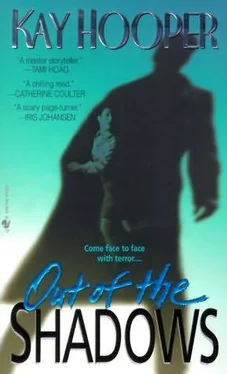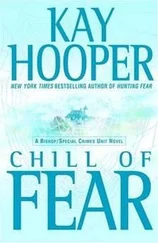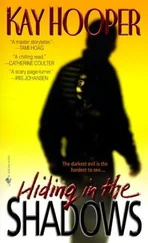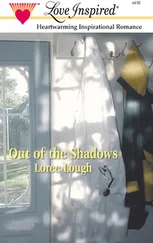"Adam apparently didn't keep the car at his home," Tony said.
"No, Julie pitched a bitch at just the idea of him having his own car, really raised hell about it. Said he was too young. So Adam fixed it with a friend to park the car at his house."
"Do you know the friend's name?"
"Lemme think. Steve somebody. Can't remember the last name."
"Penman?" Tony suggested.
"Yeah, that sounds right — Steve Penman."
"Adam kept the car at Steve's house?"
"That's what he told me. I think they lived close by, so it wasn't any trouble for Adam to walk over and get his car when he wanted it."
"I see. Thanks, Mr. Ramsay, thanks very much. If we have any more questions—"
"I'll be here."
Tony cradled the receiver and reported the conversation to Bishop. "So that's the first real connection we have between the two male victims," he noted.
"Call the Penman boy's father," Bishop suggested. "See if he knows anything about that car."
"Right."
While Tony was doing that, Miranda returned to the conference room; she had been handling reports of a couple of fender-benders and checking on the progress of the power crews.
Bishop reported the latest findings aloud. The mental link between him and Miranda remained, but in order for them to concentrate on separate things without distracting each other, they had consciously eased their "doors" almost closed. Emotions and sometimes the flicker of a thought got through, but except for their questioning Justin, and Miranda's conversation with the mayor, they had settled on communicating verbally.
It was also less confusing for Tony that way.
He watched them as he waited for Steve Penman's father to come to the phone, fascinated as always by their relationship. Bishop had been characteristically brief in explaining why his transmitter had been rather abruptly muted, saying only that he was able to "borrow" Miranda's ability to shield selectively. Tony promised himself that when there was time and leisure to explore the matter, he'd ask a few nosy questions, but what he was really interested in was the apparently effortless telepathic link between Bishop and Miranda.
Now, that was really something.
They had emerged from Miranda's office late yesterday having obviously put at least one major hurdle behind them; she was oddly serene, no longer shut off or withdrawn, and Bishop no longer paced the floor — though something in his eyes when he looked at Miranda told Tony that not everything had been settled and that worries remained. In any case, they seemed entirely comfortable with each other, the only visible tension between them being of the electric, sensual variety.
Not, Tony reflected, that they were acting like a couple of horny teenagers, all secret glances and sweaty hands grabbing at each other. No, it was something a lot more subtle than that. Tony had the feeling that if he could see psychic auras, he'd see theirs merging, melding together whenever they were near each other — and eagerly reconnecting after they had been apart for a few minutes. Because that was the sense he got, that they were touching even when they weren't.
It was really fascinating.
The telepathic communication had become obvious rather quickly, and after the second or third time one or the other of them turned to him with a comment that had clearly been the end of a conversation rather than the beginning, Tony had strongly objected.
"Will you guys quit that? It's getting spooky. Not to mention confusing."
"He's probably right," Bishop had said, clearly amused. "Or he's just jealous that he can't do it."
Tony had made a rude response to that, even though all three of them knew it was at least half true.
"Hello?"
Recalled to duty, Tony said, "Mr. Penman? This is Agent Harte. I'm really sorry to bother you again, but. . ."
"So," Miranda said to Bishop, thoughtfully, "Adam did have a car. Since when?"
"Last July, according to his uncle," Bishop replied.
"A couple of months before he disappeared." She leaned her hands on the table and gazed absently toward the bulletin board. "Has anybody checked traffic violations?"
"Tony did. None on record. The kid was either a safe driver or lucky. Either way, there was certainly nothing to make any of your deputies notice that car and mention it later when he disappeared. I'm sure his friends knew about it but, like you said before, none of us asked the right question."
She nodded, then frowned at a stack of files threatening to topple over. "Is that—"
"More missing teenagers, yeah. Alex brought the files in a little while ago. We've gone back to '87 so far, and the count is up to twenty-nine."
Miranda sank down in a chair, visibly shaken. "Twenty-nine missing kids? In thirteen years?"
"Twenty-nine reported disappearances of teens last seen within a fifty-mile radius of Gladstone," Bishop confirmed, more than a little grim himself. "We don't know for certain they even vanished, Miranda, much less vanished here. They could have resurfaced somewhere else under assumed names, or died of drugs or just life on the streets. We don't know."
"No, we don't know," Miranda murmured. "But there's at least an even chance that none of those kids got out of this town alive. My God . . . how could so many disappear without notice?"
"If you mean without official notice, consider that the disappearances averaged two or three a year over more than a dozen years. How many administrations in that time? How many strangers passing through Gladstone on their way to Nashville? And consider too that the old files weren't put on computer, where the pattern might have been seen before now."
"Still. We should have noticed. We should have seen something ."
There was nothing particularly reassuring Bishop could say, so instead he said, "One thing these files make more likely is that our killer has had a lot of practice. The steady stream of young people through this town for so many years, kids who wouldn't be missed or at least whose disappearance wouldn't be noticed by or tied to anyone locally, gave him plenty of time and opportunity to get very good at killing."
"And to get very good at disposing of the bodies." Miranda frowned. "That's another thing I don't get. If he's been successfully killing all these years, why suddenly begin leaving the bodies where they'd be found relatively quickly and easily? Both Kerry Ingram and Lynet were left in such a way that it was clear they'd be found sooner rather than later. Why?"
Bishop turned his gaze to the bulletin board and, slowly, mused, "The only thing we can be pretty certain about is that the new highway forced him to kill local kids, even kids he knew. As long as they were strangers, he could enjoy himself. But once he knew them, once he could call them by name and see their eyes or their smiles afterward in the faces of their relatives . . . maybe that was too much. Even if only subconsciously, maybe he's hoping we'll stop him."
Musing herself, Miranda said, "Adam was the first local kid to be killed. But he buried Adam just as — presumably — he buried or disposed of earlier victims, in such a way that his body wasn't likely to be found. So . . . did he bury him that way just out of habit? Because he hadn't yet even subconsciously realized he wanted to be caught? Or was there a different reason?"
Bishop thought about it, then said, "I still believe something about Adam or his murder will point directly to the killer. That's why he was buried how and where he was — because the killer knew we could discover something about him by studying that victim or that murder. And whatever it is ... he doesn't want us to know it."
"We still aren't sure how he picks his victims," Miranda offered. "Maybe it has something to do with that? Maybe he grabbed Adam for all the wrong reasons, and knew or feared we'd discover that eventually?"
Читать дальше












